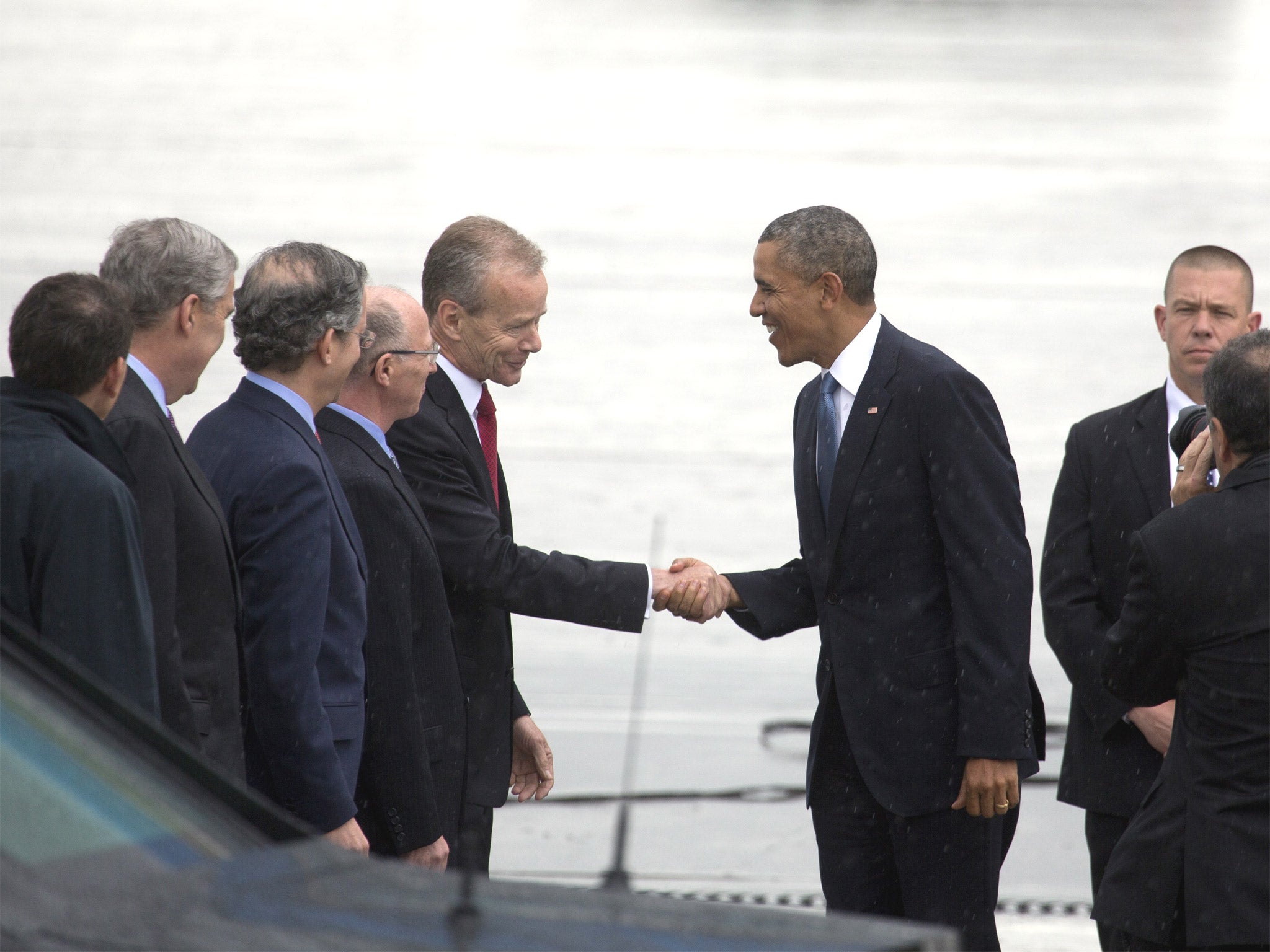G7 summit: Barack Obama accuses Vladimir Putin of a return to ‘dark tactics’ over Ukraine
President seeks to reassure European allies the US will support them if their borders are threatened by Russia

Your support helps us to tell the story
From reproductive rights to climate change to Big Tech, The Independent is on the ground when the story is developing. Whether it's investigating the financials of Elon Musk's pro-Trump PAC or producing our latest documentary, 'The A Word', which shines a light on the American women fighting for reproductive rights, we know how important it is to parse out the facts from the messaging.
At such a critical moment in US history, we need reporters on the ground. Your donation allows us to keep sending journalists to speak to both sides of the story.
The Independent is trusted by Americans across the entire political spectrum. And unlike many other quality news outlets, we choose not to lock Americans out of our reporting and analysis with paywalls. We believe quality journalism should be available to everyone, paid for by those who can afford it.
Your support makes all the difference.President Barack Obama has accused Russia of reviving the “dark tactics” of the past in its bid to maintain influence in Ukraine, as world leaders meeting in Brussels echoed his calls for Moscow to stem the separatist violence and hold talks with the new leader in Kiev.
Mr Obama used the 25th anniversary of the end of communism in Poland to draw parallels with Ukraine’s struggle today, telling crowds gathered in front of Warsaw’s Royal Castle that “the days of empire and spheres of influence are over – bigger nations must not be allowed to bully the small”.
The Kremlin’s decision to annex Crimea sparked global outrage and a round of sanctions. The US and the EU have threatened more debilitating measures targeting the Russian economy unless President Vladimir Putin stops stoking the separatist unrest gripping eastern Ukraine.
Mr Obama praised the presidential elections in Ukraine last month – which passed relatively smoothly despite the rebellion in the east – and warned Russia to respect the results. “Our free nations will stand united so that further Russian provocations will only mean more isolation and costs for Russia,” he said. “Because after investing so much blood and treasure to bring Europe together, how can we allow the dark tactics of the 20th century to define this new century?”
David Cameron said the G7 should send “a clear message of support to Ukraine and a united message to President Putin that he needs to engage with the Ukrainian government to find a diplomatic solution to the crisis”.
“That’s what I’ll be saying to President Putin myself tomorrow. This is the first summit without Russia since the 1990s. And until they change course, they need to understand that they will face continuing isolation and no seat at the table,” the Prime Minister said.
President Putin appeared to be willing to talk. “Dialogue is the best way to bridge any gaps,” he said.
The US President is on a four-day trip to Europe, where he is seeking to reassure allies about Washington’s support should Russia threaten their borders. On Tuesday he announced up to $1bn in extra military spending for the region, to be concentrated in eastern Europe.
After his Warsaw speech and meeting Ukrainian President-elect, Petro Poroshenko, Mr Obama flew to Brussels for a G7 leaders’ summit, that was to be hosted by Russia in Sochi until its indefinite suspension from the G8 in March.
A key issue for the G7 will be whether Russia is doing enough to calm the fighting in eastern Ukraine, with more deaths reported today, as government forces clashed with the separatists who have declared independent republics in some cities. Moscow denies it is behind the violence, but the German Chancellor, Angela Merkel, made clear she believes the Kremlin has the power to help end it.
“It is imperative that President Putin use his influence to get the separatists to refrain from violence and intimidation, hand over their weapons and stop the occupations,” she told the German parliament. “If this doesn’t happen... we won’t shrink from imposing further sanctions.”
The next few days are full of opportunities for diplomacy, when Mr Putin faces some of his critics for the first time since the crisis erupted. He is one of 18 world leaders attending a ceremony on Friday on the beaches of Normandy to mark the 70th anniversary of the D-Day landings. He is also due to hold meetings in Paris with David Cameron, Ms Merkel and French President François Hollande. While no official meeting is scheduled with Mr Obama, they are likely to see each other in Normandy.
While there seems to be diplomatic progress, the fighting continued in Ukraine, with government forces battling pro-Russian insurgents around the eastern town of Sloviansk, a separatist stronghold.
The G7 is not only concerned with tensions over Ukraine. German prosecutors have opened an investigation into the alleged monitoring of Ms Merkel’s cellphone by the US National Security Agency, officials said, in a move that could again complicate diplomatic relations between the two allies.
Join our commenting forum
Join thought-provoking conversations, follow other Independent readers and see their replies
Comments